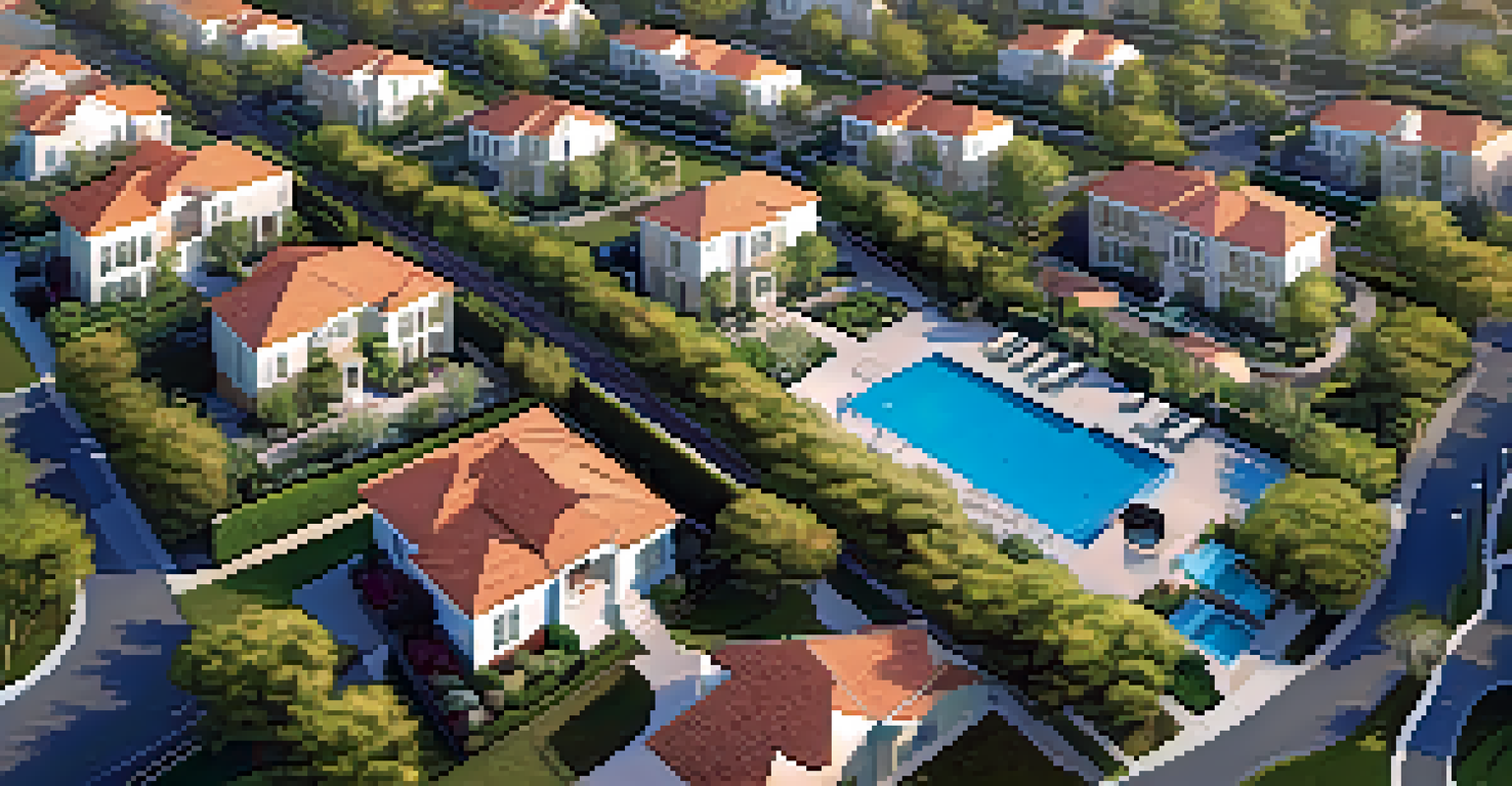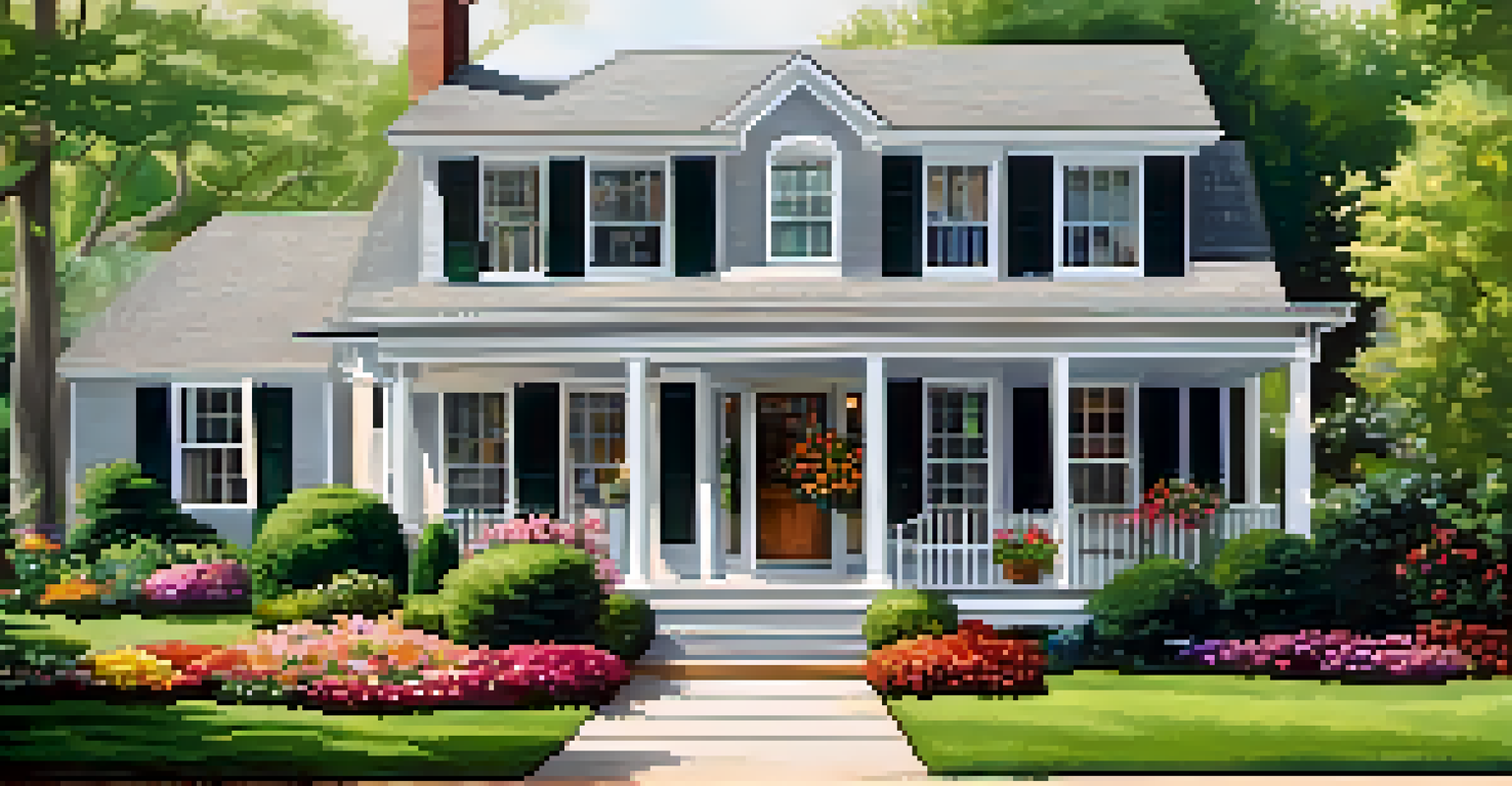How HOAs Influence Property Values in Neighborhoods

Understanding Homeowners Associations (HOAs) and Their Role
Homeowners Associations, or HOAs, are organizations in residential communities that manage shared spaces and enforce rules. Think of them as the neighborhood's governing body, ensuring that everyone maintains a certain standard. They often oversee communal areas like pools, parks, and landscaping, which can enhance the overall appeal of the neighborhood.
Homeowners associations can provide a framework for community governance and enhance the quality of life for residents.
HOAs typically require homeowners to pay monthly or annual dues. This funding is crucial for maintaining shared amenities and services, and it helps ensure that the neighborhood remains attractive and well-kept. The rules they enforce, while sometimes seen as restrictive, aim to preserve property values and community standards.
In essence, HOAs can shape the character of a neighborhood, creating a sense of community and belonging. Their influence on property values is significant, as a well-managed HOA can lead to higher demand for homes within their jurisdiction.
The Positive Impact of HOAs on Property Values
One of the primary benefits of an HOA is its potential to enhance property values. By maintaining common areas and enforcing aesthetic guidelines, HOAs help create a visually appealing environment. This can attract buyers who are willing to pay a premium for homes in well-maintained neighborhoods.

Additionally, HOAs often foster a sense of community. When residents take pride in their surroundings and participate in neighborhood events, it creates a vibrant atmosphere that can appeal to prospective buyers. A strong community can be a compelling selling point, making homes in HOA-managed areas more desirable.
HOAs Enhance Neighborhood Appeal
Homeowners Associations maintain communal areas and enforce rules, which can significantly boost property values and attract potential buyers.
Moreover, homes in neighborhoods with active HOAs tend to sell faster. Buyers often feel reassured by the presence of an HOA, knowing that there are rules in place to protect their investment. This can lead to increased competition among buyers, further driving up property values.
Potential Drawbacks of HOAs on Property Values
While there are many benefits to HOAs, potential drawbacks can also impact property values. Some homeowners may view HOA regulations as overly restrictive, leading to frustration and dissatisfaction. For instance, strict guidelines on exterior modifications can deter buyers who prefer more freedom in personalizing their homes.
A well-maintained neighborhood can increase property values significantly, making it a win-win for homeowners and buyers alike.
Additionally, if an HOA is poorly managed or has financial troubles, it can negatively affect property values. Homeowners may become wary of investing in a neighborhood with an HOA that struggles to maintain facilities or enforce rules consistently. This can lead to a decline in community appeal, ultimately impacting home prices.
Moreover, high HOA fees can deter potential buyers, especially if they feel the costs outweigh the benefits. If prospective residents perceive that they will not receive value from their dues, they may look elsewhere, causing property values to stagnate or decline.
The Influence of HOA Rules on Marketability
HOA rules can significantly influence the marketability of properties within a neighborhood. For instance, guidelines regarding landscaping, paint colors, and even parking can create a cohesive look that appeals to buyers. A uniform appearance often leads to a greater sense of pride among homeowners, which can enhance the overall desirability of the area.
On the flip side, overly stringent rules can limit the appeal to a broader range of buyers. If potential homeowners feel that they cannot express their individuality, they may shy away from purchasing a property in that neighborhood. This can lead to a smaller pool of interested buyers, ultimately affecting property values.
HOA Rules Impact Marketability
While HOA regulations can create a cohesive neighborhood aesthetic, overly strict rules may deter buyers seeking personal expression.
Therefore, striking a balance in HOA regulations is crucial. While some rules are necessary to maintain harmony, excessive restrictions can deter prospective homeowners and negatively influence marketability.
Comparing HOA Neighborhoods to Non-HOA Areas
When comparing neighborhoods with HOAs to those without, the differences in property values can be striking. Generally, homes in HOA-managed communities tend to command higher prices due to the perceived stability and maintenance of the area. Buyers often associate HOAs with well-kept environments and engaged communities.
Conversely, non-HOA neighborhoods may offer more freedom but can lack the same level of upkeep. In these areas, individual homeowners may have varying levels of commitment to property maintenance, which can lead to inconsistencies. This lack of uniformity can deter potential buyers who prioritize aesthetics and community involvement.
Ultimately, the choice between HOA and non-HOA neighborhoods depends on individual preferences. Some buyers may appreciate the structure and support of an HOA, while others might prefer the freedom of managing their property independently.
How Market Trends Affect HOA Influence
Market trends can significantly impact the influence of HOAs on property values. During a booming real estate market, buyers may overlook HOA restrictions in favor of desirable locations and amenities. This can lead to increased demand for homes within HOA-managed communities, driving up property values.
Conversely, in a declining market, potential buyers may become more cautious and scrutinize HOA rules closely. If economic conditions cause buyers to prioritize affordability, they may see HOA fees as an additional burden. This can lead to decreased interest in homes with HOAs, ultimately affecting property values.
Market Trends Affect HOA Value
Economic conditions can shift buyer perceptions of HOAs, with strong markets overlooking restrictions while weak markets make HOA fees seem burdensome.
Additionally, trends toward sustainable living and community-oriented spaces can enhance the appeal of HOA-managed neighborhoods. Buyers increasingly value amenities such as parks, walking trails, and community events, which are often well-maintained by HOAs. This shift can further bolster property values in neighborhoods that embrace these trends.
The Long-Term Effects of HOAs on Property Values
The long-term effects of HOAs on property values can be significant and multifaceted. Over time, a well-managed HOA can contribute to a stable and desirable community, fostering continued demand for homes in the area. This consistency often leads to appreciating property values, benefiting homeowners in the long run.
However, if an HOA faces challenges such as mismanagement or community dissatisfaction, it can have lasting negative effects. Homeowners may find themselves in a declining market as potential buyers steer clear of neighborhoods with a troubled HOA. Such a situation can lead to stagnant or plummeting property values over time.

Ultimately, understanding the long-term dynamics of HOAs is crucial for prospective buyers and current homeowners alike. A proactive, engaged HOA can promote a thriving community, while neglect and dissatisfaction can hinder property value growth.